MercoPress. South Atlantic News Agency
Tag: Diosdado Cabello
-
Tuesday, August 13th 2019 - 07:34 UTC
Venezuela considers holding 2020 congressional elections earlier, to reclaim control of the National Assembly
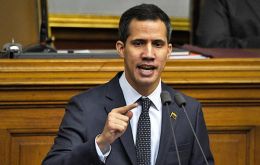
Venezuela's pro-government legislature on Monday agreed to create a commission to evaluate holding 2020 legislative elections early, which would create an opportunity for the government to reclaim control of the opposition-dominated congress.
-
Thursday, August 8th 2019 - 09:30 UTC
Thousands march in support of Maduro chanting “Yankee go home”
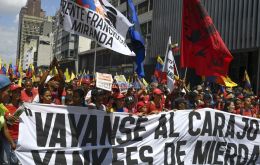
Thousands of supporters of Venezuelan leader Nicolas Maduro marched through the capital Caracas on Wednesday in protest against attempts by US President Donald Trump to asphyxiate the ruling regime.
-
Saturday, June 8th 2019 - 08:30 UTC
Venezuela and Cuba make a display of unity with Cabello's visit to Havana
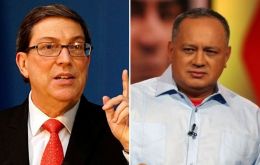
Venezuela's ruling Socialist Party Vice President Diosdado Cabello met with Cuban government officials on Friday during a trip to Havana in a show of unity even as Cuba is being courted to help resolve the political crisis facing its ally.
-
Tuesday, April 30th 2019 - 23:59 UTC
Venezuela: Juan Guaidó and Leopoldo López appear together with military forces in Caracas
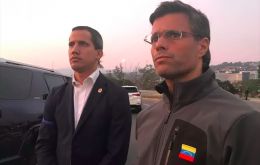
The president in charge of Venezuela, Juan Guaidó, announced from the military air base of La Carlota that since Tuesday, April 30, Operation Libertad began to “cease the usurpation” of Nicolás Maduro's regime. Civilians gathered at the east of Caracas in support of the military insurrection and Military supporters of Maduro government took part of the base of the Military Aviation, armed with long weapons.
-
Tuesday, March 12th 2019 - 19:31 UTC
Bachelet “concerned” about the arrest of Venezuelan journalist and activist Luis Carlos Díaz
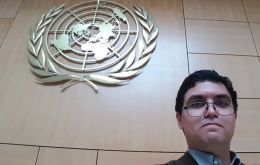
Luis Carlos Diaz, a Venezuelan journalist who is an expert in networks and critical of the Nicolás Maduro regime, was arrested on Monday, without capture order, by the Bolivarian Intelligence Service (SEBIN) after leaving his radio program, denounced his wife and colleague Naky Soto. On Tuesday, the UN High Commissioner for Human Rights, Michelle Bachelet, referred to the arrest and asked the authorities for “urgent access” for her technical mission in Venezuela to Díaz.
-
Tuesday, January 29th 2019 - 14:28 UTC
Guaidó on military option in Venezuela: All options are on the table
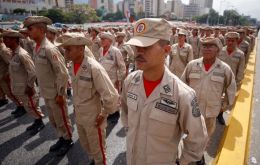
Consulted on possible military option in Venezuela, the declared interim President of Venezuela, Juan Guaidó, told the CNN channel that all the options are on the table “to achieve the cessation of the usurpation”.
-
Tuesday, January 22nd 2019 - 08:37 UTC
Venezuela foils uprising by National Guardsmen; massive protest march announced for Wednesday
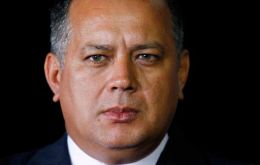
Venezuela plunged deeper into turmoil Monday as security forces put down a pre-dawn uprising by National Guardsmen that triggered violent street protests, and the Supreme Court moved to undercut the opposition-controlled congress' defiant new leadership. Socialist party chief Diosdado Cabello said 27 guardsmen were arrested and more could be detained as the investigation unfolds.
-
Wednesday, January 16th 2019 - 08:35 UTC
Maduro declared an “usurper” by Venezuela's freely elected National Assembly

Venezuela's opposition-run congress on Tuesday formally declared President Nicolas Maduro a “usurper” whose actions would be considered null and void, after he was sworn in last week for a disputed second term. Maduro was inaugurated on Jan. 10 under an avalanche of criticism that his leadership was illegitimate following a 2018 election widely viewed as fraudulent.
-
Wednesday, September 26th 2018 - 09:04 UTC
Trump urges the UN to support a “restoration of democracy” in Venezuela

The United States imposed new sanctions on President Nicolas Maduro’s wife and several of his top allies on Tuesday as U.S. President Donald Trump urged members of the United Nations to support a “restoration of democracy” in the once-booming Venezuela oil producing nation.
-
Thursday, June 14th 2018 - 08:23 UTC
Miami media says US$ 800 million in assets of Diosdado Cabello frozen in the US, but he flatly denies the version
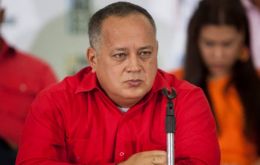
The U.S. government has frozen about US$ 800 million in assets from senior Venezuelan leader Diosdado Cabello Miami journalist Oscar Haza reported Tuesday during his morning radio show on Miami’s Spanish-language Zeta 92.3.
